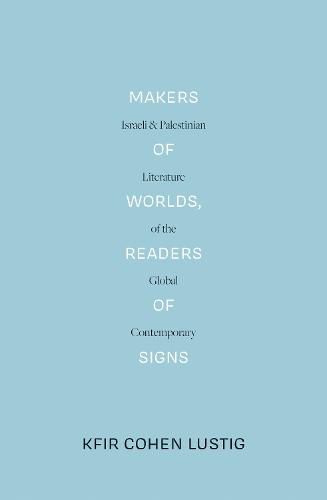Readings Newsletter
Become a Readings Member to make your shopping experience even easier.
Sign in or sign up for free!
You’re not far away from qualifying for FREE standard shipping within Australia
You’ve qualified for FREE standard shipping within Australia
The cart is loading…






Makers of Worlds, Readers of Signs charts the aesthetic and political formation of neoliberalism and globalization in Israeli and Palestinian literature from 1945 to the present. By tracking literature’s move from making worlds to reading signs, Dr. Cohen Lustig proposes a new way to read theorize our global contemporary.
Dr. Kfir Cohen Lustig argues that the period of Israeli statehood and its counterpart of Palestinian statelessness produced works that sought to make and create whole worlds - create the new nation of Israel, preserve collective visions of Palestinian statehood.
During the period of neoliberalism, the period after 1985 in Israel and the 1993 Oslo Accords in Palestine, literature became about the reading of signs, about individual subjects involved in private lives. Following in the tradition of his mentor Fredric Jameson, Cohen argues for new ways to track the subjectivities and aesthetics produced by larger shifts in production. In so doing, he proposes a new model to understand the historical development of Israeli and Palestinian literature as well as world literature in our contemporary moment.
With a preface from Fredric Jameson.
$9.00 standard shipping within Australia
FREE standard shipping within Australia for orders over $100.00
Express & International shipping calculated at checkout
Makers of Worlds, Readers of Signs charts the aesthetic and political formation of neoliberalism and globalization in Israeli and Palestinian literature from 1945 to the present. By tracking literature’s move from making worlds to reading signs, Dr. Cohen Lustig proposes a new way to read theorize our global contemporary.
Dr. Kfir Cohen Lustig argues that the period of Israeli statehood and its counterpart of Palestinian statelessness produced works that sought to make and create whole worlds - create the new nation of Israel, preserve collective visions of Palestinian statehood.
During the period of neoliberalism, the period after 1985 in Israel and the 1993 Oslo Accords in Palestine, literature became about the reading of signs, about individual subjects involved in private lives. Following in the tradition of his mentor Fredric Jameson, Cohen argues for new ways to track the subjectivities and aesthetics produced by larger shifts in production. In so doing, he proposes a new model to understand the historical development of Israeli and Palestinian literature as well as world literature in our contemporary moment.
With a preface from Fredric Jameson.